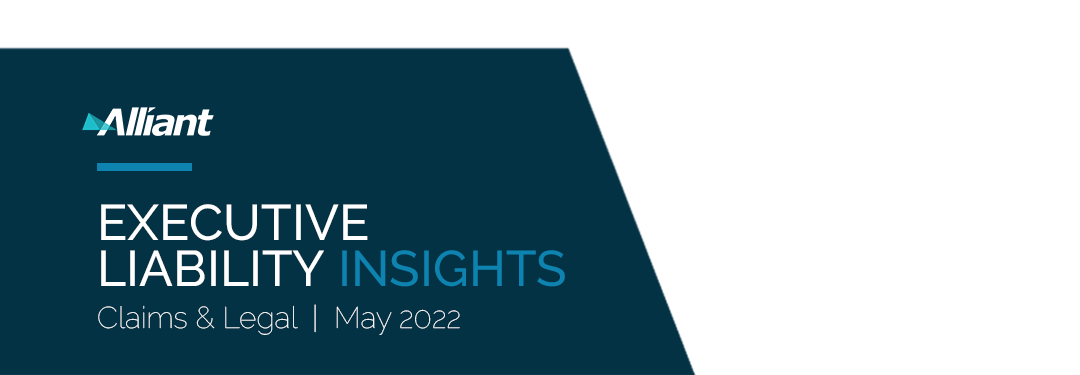
Navigating today’s complex risk environment can be a monumental task. Steve Shappell, Alliant Claims & Legal, spearheads Executive Liability Insights, a monthly review of news, legal developments and information on executive liability, cyber risk, employment practices liability, class action trends and more.

FEATURED ARTICLE
COURT KEEPS INVESTORS’ FRAUD ALLEGATIONS ALIVE IN CYBERSECURITY-RELATED SECURITIES SUIT
In re SolarWinds Corp. Sec. Litig., No. 1:21-cv-00138 (W.D. Tex. Mar. 30, 2022)
The Chief Information Officer (“CIO”) had become the public face of the company’s cyber health prior to a massive breach of its network monitoring software in 2020. The attack allowed Russian military operatives to gain access to data from the company’s elite clientele, including the Departments of Homeland Security, Commerce and Treasury, as well as several high-profile companies.
In This Issue:
COURT KEEPS INVESTORS’ FRAUD ALLEGATIONS ALIVE IN CYBERSECURITY-RELATED SECURITIES SUIT
In re SolarWinds Corp. Sec. Litig., No. 1:21-cv-00138 (W.D. Tex. Mar. 30, 2022)
A Federal court recently kept alive allegations that a systems software company misled investors about its digital defenses, citing an executive’s touting of the company’s rigorous security posture.
Read More >>
DERIVATIVE SUIT DISMISSED FOR FAILURE TO SPECIFICALLY ALLEGE DEMAND FUTILITY UNDER OHIO LAW
In Re Fifth Third Bancorp Derivative Litig., No. 20 C 4115 (N.D. Ill. Mar. 30, 2022)
Shareholders filed a derivative lawsuit against current and former directors of a financial institution for an alleged “cover up” of abusive and fraudulent sales techniques and unauthorized transactions in customer accounts.
Read More >>
SCOTUS LIMITS FEDERAL JURISDICTION TO CONFIRM OR VACATE ARBITRATION AWARDS
Badgerow v. Walters et al., No. 20-1143 (U.S. Mar. 31, 2022)
A former employee of a financial advisory firm initiated a Financial Industry Regulatory Authority arbitration action against her former employer, alleging unlawful termination under federal and state law.
Read More >>
BROAD ‘FINANCIAL REMUNERATION’ EXCLUSION PRECLUDES COVERAGE UNDER PROFESSIONAL LIABILITY POLICY
RLI Ins. Co. v. Coastline Title of Pinellas, LLC and Atoni Kruk, No. 8:20-cv-0786 (M.D. Fla. Mar. 8, 2022)
A property purchaser filed a class action complaint against the closing agent in a real estate sale, alleging the agent violated the purchase agreement by wrongfully charging him closing fees for the transaction instead of the seller.
Read More >>
COURTS CONSISTENTLY APPLY INSURED VS. INSURED EXCLUSIONS IN D&O POLICIES
T.D. Williamson, Inc. v. Fed. Ins. Co., No. 21-5043 (10th Cir. Apr. 14, 2022)
Stoneburner v. RSUI Indemnity Co., No. 2:21-cv-00023-DBB (D. Utah Apr. 12, 2022)
Two courts were recently presented with similar issues regarding the application of the Insured vs. Insured exclusion in a directors and officers liability (“D&O”) policy.
Read More >>
SETTLEMENTS FOR HIPAA VIOLATIONS EXCLUDED AS ‘FINES AND PENALTIES’ UNDER CGL POLICY
Atlantic Specialty Ins. Co. v. Lexington Ins. Co., No. 2:21-cv-00616 (W.D. Wash. Feb. 7, 2022)
Numerous individuals and state attorneys general filed class action lawsuits (the “AG matters”) alleging violations of the Health Insurance Portability and Accountability Act (“HIPAA”) after a health insurance company suffered a security breach to its computer systems.
Read More >>
FEE EXCLUSION IN D&O POLICY IS INAPPLICABLE
Adelphia Commc'ns Corp. v. U.S. Specialty Ins. Co. (In re Adelphia Commc'ns Corp.), No. 02-41729 (SHL) (Bankr. S.D.N.Y. Mar. 17, 2022)
Following a communications company’s Chapter 11 Bankruptcy filing, the bankruptcy court appointed a plan administrator, which was vested with the rights, powers, and executive authority of the board of directors.
Read More >>
CYBER CORNER
Click to read the following cases:
- FBI CAUTIONS AGAINST LEGISLATIVE PUSH TO BAN RANSOMWARE PAYMENTS
- COURT FINDS GENERAL LIABILITY POLICY COVERS SOME LOSSES FROM DATA BREACH
Read More >>
EPL CORNER
Click to read the following cases:
- COVERAGE UNDER HOUSING ASSOCIATION’S EPL POLICY EXCESS TO CGL POLICY IN ACCORDANCE WITH EPL POLICY’S “OTHER INSURANCE” CLAUSE
Read More >>
SEC CORNER
Click to view the following cases:
- SEC SEEKS TO TIGHTEN REINS ON SPACS
- ENFORCEMENT DIVISION’S 2022 PRIORITIES
Read More >>
SHAREHOLDER CORNER
Click to view the following:
- APRIL 2022 SECURITIES CLASS ACTION FILINGS
Read More >>
COURT KEEPS INVESTORS’ FRAUD ALLEGATIONS ALIVE IN CYBERSECURITY-RELATED SECURITIES SUIT
In re SolarWinds Corp. Sec. Litig., No. 1:21-cv-00138 (W.D. Tex. Mar. 30, 2022)
A Federal court recently kept alive allegations that a systems software company misled investors about its digital defenses, citing an executive’s touting of the company’s rigorous security posture.
The Chief Information Officer (“CIO”) had become the public face of the company’s cyber health prior to a massive breach of its network monitoring software in 2020. The attack allowed Russian military operatives to gain access to data from the company’s elite clientele, including the Departments of Homeland Security, Commerce and Treasury, as well as several high-profile companies.
The judge found the CIO’s appearance in interviews and on the company website extolling “heavy-duty hygiene” around cybersecurity was sufficient to keep a putative Securities Fraud class action suit alive. The complaint alleges the company misled investors about its robust security measures, while sacrificing security for “short-term profits.” Citing glaring cybersecurity gaps such as using simplistic passwords, the judge determined the investors had satisfactorily pleaded that the CIO “acted with, at least, severe recklessness, when he touted the security measures implemented at [the company].”

The Takeaway
Cybersecurity has evolved into a boardroom issue. Cyber-risk carries with it an exposure to financial loss and reputational harm, but also requires transparency to investors around a company’s preparedness and resiliency, such that misrepresentations can create exposure for directors and officers.
DERIVATIVE SUIT DISMISSED FOR FAILURE TO SPECIFICALLY ALLEGE DEMAND FUTILITY UNDER OHIO LAW
In Re Fifth Third Bancorp Derivative Litig., No. 20 C 4115 (N.D. Ill. Mar. 30, 2022)
Shareholders filed a derivative lawsuit against current and former directors of a financial institution for an alleged “cover up” of abusive and fraudulent sales techniques and unauthorized transactions in customer accounts.

The individual defendants asked the court to dismiss the suit, arguing the shareholders failed to sufficiently challenge the board’s decision making process, a legal argument known as “demand futility.” Since the company was incorporated in Ohio, the defendants argued the legal standards of that state should control. Pursuant to Ohio law, it is the plaintiffs’ burden to plead that “a majority of the directors are so personally and directly conflicted or committed to the decision in dispute that they cannot reasonably be expected to respond to a demand in good faith and within the ambit of the business judgment rule.”
The shareholders made numerous arguments as to why a demand on the board would have been futile, including prior relationships between the directors, corporate sponsorships that would impact how certain directors may vote, recent bylaw amendments to guaranty indemnification of the directors, and the existence of directors and officers liability (“D&O”) insurance to shield the directors from personal financial loss. The court, however, was not persuaded, and applying Ohio law, dismissed the complaint on the grounds the shareholders were not excused from making a demand on the board. The court further found the shareholders failed to show that any of the director defendants faced a substantial likelihood of personal liability on the asserted breach of fiduciary duty or securities fraud claims, which would have allowed the shareholders to allege demand futility.
SCOTUS LIMITS FEDERAL JURISDICTION TO CONFIRM OR VACATE ARBITRATION AWARDS
Badgerow v. Walters et al., No. 20-1143 (U.S. Mar. 31, 2022)
A former employee of a financial advisory firm initiated a Financial Industry Regulatory Authority arbitration action against her former employer, alleging unlawful termination under federal and state law.

When the arbitrators issued an award in favor of the firm and dismissed the claims, the former employee filed suit in state court in an effort to vacate the arbitral decision. The employer then removed the suit to federal court. Using a “look-through” approach that considered the substance of the parties’ underlying dispute, that court determined it had jurisdiction over the petition to vacate, but declined to overturn the arbitration award.
In an 8-1 ruling, the U.S. Supreme Court concluded the Federal Arbitration Act (“FAA”) does not sanction federal courts to search an underlying arbitration dispute for a federal question in order to establish jurisdiction to confirm, vacate, or modify an arbitral award. In doing so, the high court reversed a Fifth Circuit order that had found the trial court correctly asserted jurisdiction over the former employee’s attempt to overturn the arbitral decision. Federal courts typically have jurisdiction whenever an action turns on a “federal question.” However, the Court’s decision, authored by Justice Kagan, noted that the FAA's provisions do not themselves support federal jurisdiction, so a federal court must find an independent basis for jurisdiction to resolve an arbitral dispute. In order to determine whether it has an independent jurisdictional basis, a court must look to the face of the application to confirm or deny the arbitral award. Taken by themselves, disputes regarding the enforceability of an award usually only raise matters of state law, the Court observed. And in the dispute at issue, the face of the applications did not support the exercise of jurisdiction, whether on the basis of “diversity” (meaning parties from different states) or by turning upon a question of federal law.
The Court next looked at whether a federal court could use the so-called “look-through” approach to identify a basis for asserting jurisdiction that was not apparent on the face of the application, but which could be gathered from the underlying dispute. In its decision in Vaden v. Discover Bank, the Court had previously approved the look-through approach in the context of FAA Section 4 when it held that, in determining whether a federal court has jurisdiction over the subject-matter of a case for purposes of a motion to compel arbitration, a federal court may “look through” the petition to the underlying dispute between the parties. As Justice Kagan explained, however, Vaden was based on a different section of the FAA, which did not apply to an application to confirm or vacate an award.” In declining to apply Vaden’s look-though approach here, Justice Kagan noted “Congress could have replicated Section 4's look-through instruction in Sections 9 and 10,” or it “could have drafted a global look-through provision, applying th[at] approach throughout the FAA. But Congress did neither.” Sections 9 and 10 of the FAA “do not mention the court's subject-matter jurisdiction at all,” Kagan wrote, “so under ordinary principles of statutory construction, the look-through method for assessing jurisdiction should not apply.”
Instead, the Court concluded federal courts must use traditional jurisdictional rules and may only look to the application to determine whether they have jurisdiction over petitions to confirm or vacate domestic arbitral awards. As such, federal jurisdiction may not be available to parties disputing an arbitral award when the only basis for jurisdiction is that the underlying dispute involves a federal question.
BROAD ‘FINANCIAL REMUNERATION’ EXCLUSION PRECLUDES COVERAGE UNDER PROFESSIONAL LIABILITY POLICY
RLI Ins. Co. v. Coastline Title of Pinellas, LLC and Atoni Kruk, No. 8:20-cv-0786 (M.D. Fla. Mar. 8, 2022)
A property purchaser filed a class action complaint against the closing agent in a real estate sale, alleging the agent violated the purchase agreement by wrongfully charging him closing fees for the transaction instead of the seller.

The closing agent tendered the complaint to its professional liability insurance company, but the insurer denied the claim, arguing it had no duty to defend or indemnify the agent.
The professional liability policy defined a “Claim” as a “demand for money as compensation for a Wrongful Act” or a “lawsuit against the insured that sought to hold the insured responsible for a Wrongful Act.” Furthermore, “Wrongful Act” was defined as “any actual or alleged error, omission or negligent act, committed solely in the rendering of or failure to render Professional Services by an Insured.” Lastly, the policy precluded coverage for damages and expenses in connection with any “Claim … in any way involving” profiting to which the insured “was not legally entitled.”
The insurance company argued that the exclusions in the policy prevented the complaint from triggering its duty to defend the agent. In its ruling, the court noted that an insurer’s duty to defend depends on whether the underlying complaint “alleges facts that fairly and potentially bring the action within policy coverage.” Additionally, where only some allegations in a complaint trigger an insurer’s duty to defend, the insurer is obligated to defend the entire suit. In the case at hand, the complaint alleged that the closing agent had improperly retained fees for closing services from the purchaser and other class members. The insurance company therefore argued the allegation fell squarely within the exclusion for gaining “personal profit, remuneration or advantage” to which it was not legally entitled. The insured, on the other hand, argued the closing services fee was only “negligently and improperly charged” to the buyer, not that the conduct was illegal, excessive, or unlawful.
The court found that either way, the transaction constituted conduct “in any way involving” the receipt of remuneration to which the insured lacked legal entitlement. Furthermore, the court stated that whether the insurance company has a duty to defend depends on the allegations in the complaint, irrespective of the legal theory of liability, and not on the complaint’s merits. Lastly, the court concluded that the phrase “in any way involving” was meant to exclude a broad array of allegations. Accordingly, the court ruled the exclusion was applicable and the insurer did not have a duty to defend the insured in the underlying litigation.
The Takeaway
Broad exclusionary language like the kind contained in the policy at issue here can be extremely damaging to insureds. This is especially true in professional liability policies, where all transactions that could give rise to litigation will likely involve the provision of “professional services” rendered for a fee and arising out of contractual agreements. It is essential to review all policy exclusions and make every attempt to narrow the wording as much as possible in order to avoid unintended consequences.
COURTS CONSISTENTLY APPLY INSURED VS. INSURED EXCLUSIONS IN D&O POLICIES
T.D. Williamson, Inc. v. Fed. Ins. Co., No. 21-5043 (10th Cir. Apr. 14, 2022)
Stoneburner v. RSUI Indemnity Co., No. 2:21-cv-00023-DBB (D. Utah Apr. 12, 2022)

Two courts were recently presented with similar issues regarding the application of the Insured vs. Insured exclusion in a directors and officers liability (“D&O”) policy.
In each instance, the underlying suit alleged both derivative and direct claims by directors of a company against other directors. Additionally, all parties to the suits acknowledged that each individual constituted an “Insured” under the applicable insurance policy.
Each court maintained that a lower court’s decision concluding there was no duty to defend or indemnify the insured due to the application of the Insured vs. Insured exclusion was appropriate. In their respective decisions, each court stated that the D&O policy at issue was interpreted based upon its “plain and ordinary meaning,” and that only when an insurance contract was ambiguous would a court look to extrinsic evidence and interpret the contract against the drafter. In each case, the court found the Insured vs. Insured exclusion was clear and did not cover claims brought by an insured person in any capacity against another insured. Furthermore, each court noted that the case illustrated “the prototypical purpose of an Insured versus Insured Exclusion,” which is to prevent coverage of personal disputes between family members within a corporation, and that such an exclusion precludes coverage for the entire underlying suit brought by insured plaintiffs.
SETTLEMENTS FOR HIPAA VIOLATIONS EXCLUDED AS ‘FINES AND PENALTIES’ UNDER CGL POLICY
Atlantic Specialty Ins. Co. v. Lexington Ins. Co., No. 2:21-cv-00616 (W.D. Wash. Feb. 7, 2022)

Numerous individuals and state attorneys general filed class action lawsuits (the “AG matters”) alleging violations of the Health Insurance Portability and Accountability Act (“HIPAA”) after a health insurance company suffered a security breach to its computer systems.
The company was able to negotiate a settlement with all parties and agreed to pay several million dollars into a settlement fund. Thereafter, the company sought coverage for the lawsuits under its commercial general liability (“CGL”) policy as well as its excess errors and omissions (“E&O”) program.
Although the CGL insurers contributed toward the settlement, they later filed suit arguing they were not obligated to defend or indemnify the company in the AG matters. Additionally, the CGL insurers sought a contribution from the E&O insurers to the amount paid to the settlement fund. Specifically, the CGL insurers stated there was no coverage for “fines and penalties” or for injuries arising out of the violation of any federal, state, or local statute, ordinance, or regulation “that addresses, prohibits or limits the printing, dissemination, disposal, collecting, recording, sending, transmitting, communicating or distribution of material or information.”
The court concluded the term “fines and penalties” was not ambiguous and therefore was to be given its plain meaning. Looking to the definition of the term in Black’s Law Dictionary, the court determined that “fines and penalties” constitute a “pecuniary punishment” and allows an insurer to deny coverage when an item is “punitive, rather than compensatory.” To that end, the court found that the sums paid to settle the state lawsuits were exacted as a punishment, as HIPAA does not provide for a private right of action, and the payments were instructed to be made to the public treasury. Given that the AG matters contained similar language, the court concluded those settlement payments likewise constituted “fines and penalties.” The court declined to issue a ruling relative to the E&O policies.
The Takeaway
The issue of coverage and insurability for fines and penalties continues to be a hotly debated topic and coverage of fines and penalties should be pushed for wherever and whenever possible. In jurisdictions where punitive damages are insurable, certainly fines and penalties would be as well, since the level of culpable conduct warranting fines and penalties is almost always lower than that of punitive damages.
FEE EXCLUSION IN D&O POLICY IS INAPPLICABLE
Adelphia Commc'ns Corp. v. U.S. Specialty Ins. Co. (In re Adelphia Commc'ns Corp.), No. 02-41729 (SHL) (Bankr. S.D.N.Y. Mar. 17, 2022)
Following a communications company’s Chapter 11 Bankruptcy filing, the bankruptcy court appointed a plan administrator, which was vested with the rights, powers, and executive authority of the board of directors.

The company agreed to indemnify the plan administrator for expenses incurred in carrying out its responsibilities to the company. To that end, the administrator obtained directors and officers liability (“D&O”) insurance, which included coverage for “Professional Services,” as defined in the policy.
Thereafter, a creditor filed an objection to the appointment of the administrator and sought their removal for cause. After a successor administrator was appointed, the company and the administrator sought coverage from the D&O insurer for the fees, costs, and expenses incurred defending the creditor objection motions and investigations.
The insurer denied the claim, citing an exclusion in the policy precluding coverage for any claim that arose “out of any fee or compensation due the Administrator for services provided pursuant to the Agreement.” In the ensuing coverage litigation, the court determined that the “Fee Exclusion” was not applicable, as the exclusion expressly applied only to unpaid fees owed to the administrator in the performance of duties in executing the agreement. Therefore, the court ruled that the costs of the investigation into the administrator’s activities did not fall within the exclusion as they were not incurred in the furtherance of the execution of the agreement.
The Takeaway
It is imperative that insureds pay close attention to exclusionary language in any insurance policy, particularly those involving professional services. The language should be precise around what the parties intend to exclude. Furthermore, professional services exclusions should be as narrow as possible so as not to provide illusory cover.
Cyber Corner
FBI CAUTIONS AGAINST LEGISLATIVE PUSH TO BAN RANSOMWARE PAYMENTS
North Carolina recently became the first state to prohibit ransom payments by state agencies and local governments, and New York and Pennsylvania are considering similar legislation.
COURT FINDS GENERAL LIABILITY POLICY COVERS SOME LOSSES FROM DATA BREACH
In an unusual reversal, a Federal court recently reconsidered its prior ruling and will permit a retailer to recover from its general liability policy certain losses it sustained following a 2013 data breach in which a hacker managed to gain access to payment card information and personal contact details for the retailer’s cardholders.
COVERAGE UNDER HOUSING ASSOCIATION’S EPL POLICY EXCESS TO CGL POLICY IN ACCORDANCE WITH EPL POLICY’S “OTHER INSURANCE” CLAUSE
Great Am. Ins. Co. v. Phila. Indem. Ins. Co., No. C-200353 (Ohio Ct. App. Apr. 6, 2022)
SEC Corner
SEC SEEKS TO TIGHTEN REINS ON SPACS
The U.S. Securities and Exchange Commission (“SEC”) is proposing stricter rules for special purpose acquisition companies (“SPACs”), according to Chair Gary Gensler, in order to provide SPAC investors with the same protections afforded to those investing in traditional initial public offerings.
ENFORCEMENT DIVISION’S 2022 PRIORITIES
The U.S. Securities and Exchange Commission’s (“SEC”) Enforcement Division recently announced its annual examination priorities to provide insights into its risk-based approach, including the areas it believes present potential risks to investors and the integrity of the U.S. capital markets. The SEC’s 2022 examination priorities primarily focuses on the following areas:
|
Director/Officer |
Role |
Company |
|
Eric A. Alexander |
Former CFO |
1 Global Capital, LLC |
|
Scott A. Merkelson |
Former Director of Bus. Dev. |
1 Global Capital, LLC |
|
Fernando Passos |
Former EVP of Finance |
IRB Brasil Resseguros S.A. |
|
Anthony M. Baker |
President, CEO |
Island Capital Inc. |
April 2022 Noteworthy Settlements and Judgments
|
Amount |
Director/Officer |
Role |
Company |
|
$2,819,692.00 |
Andrew J. Chapin |
Former CEO |
Benja Inc. |
|
$100,000.00 |
John W. Gunn |
Chairman |
Global Investment Strategy UK Ltd. |
Source: U.S. Securities and Exchange Commission
Shareholder Corner
APRIL 2022 SECURITIES CLASS ACTION FILINGS
Elon R. Musk : Twitter Common Stock
Source: Stanford Law School Securities Class Action Clearinghouse
ABOUT ALLIANT INSURANCE SERVICES
Alliant Insurance Services is the nation’s leading specialty broker. In the face of increasing complexity, our approach is simple: hire the best people and invest extensively in the industries and clients we serve. We operate through national platforms to all specialties. We draw upon our resources from across the country, regardless of where the resource is located.
Contributors

Abbe Darr, Esq.
Claims Attorney
abbe.darr@alliant.com
David Finz, Esq.
Claims Attorney
david.finz@alliant.com
Jacqueline Noster, Esq.
Claims Attorney
jacqueline.noster@alliant.com
Jacqueline Vinar, Esq.
Claims Attorney
jacqueline.vinar@alliant.com
Jaimi Berliner, Esq.
Claims Attorney
jaimi.berliner@alliant.com
Katherine Puthota
Claims Advocate
katherine.puthota@alliant.com
Matia Marks, Esq.
Claims Attorney
matia.marks@alliant.com
Meaghan Fisher
Senior Claims Advocate
meaghan.fisher@alliant.com
Megan Padgett
Senior Claims Advocate
megan.padgett@alliant.com
Robert Aratingi
Senior Claims Advocate
robert.aratingi@alliant.com
Robert Aratingi
Senior Claims Advocate
robert.aratingi@alliant.com
Robert Hershkowitz, Esq.
Claims Attorney
robert.hershkowitz@alliant.com
Steve Levine, Esq.
Claims Attorney
slevine@alliant.com
Vanessa Gonzalez
Senior Claims Advocate
vanessa.gonzalez@alliant.com